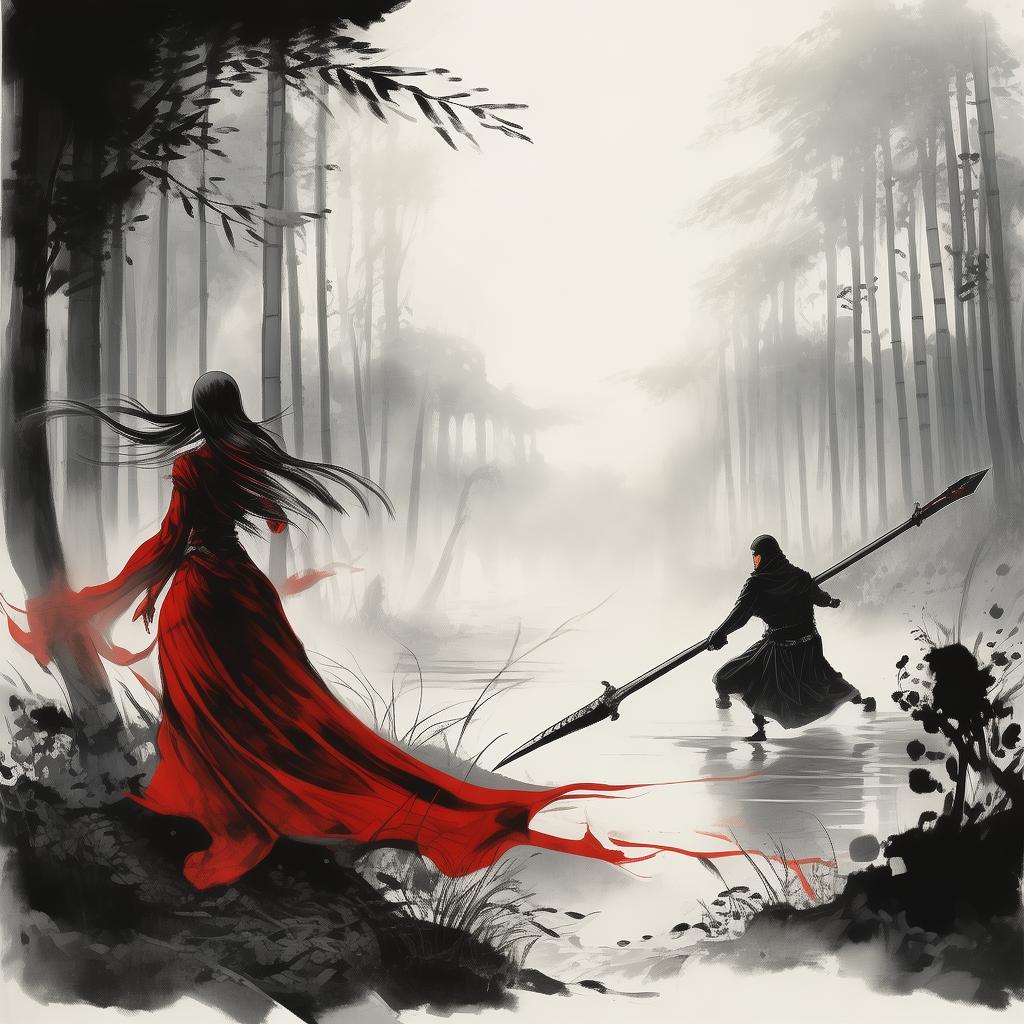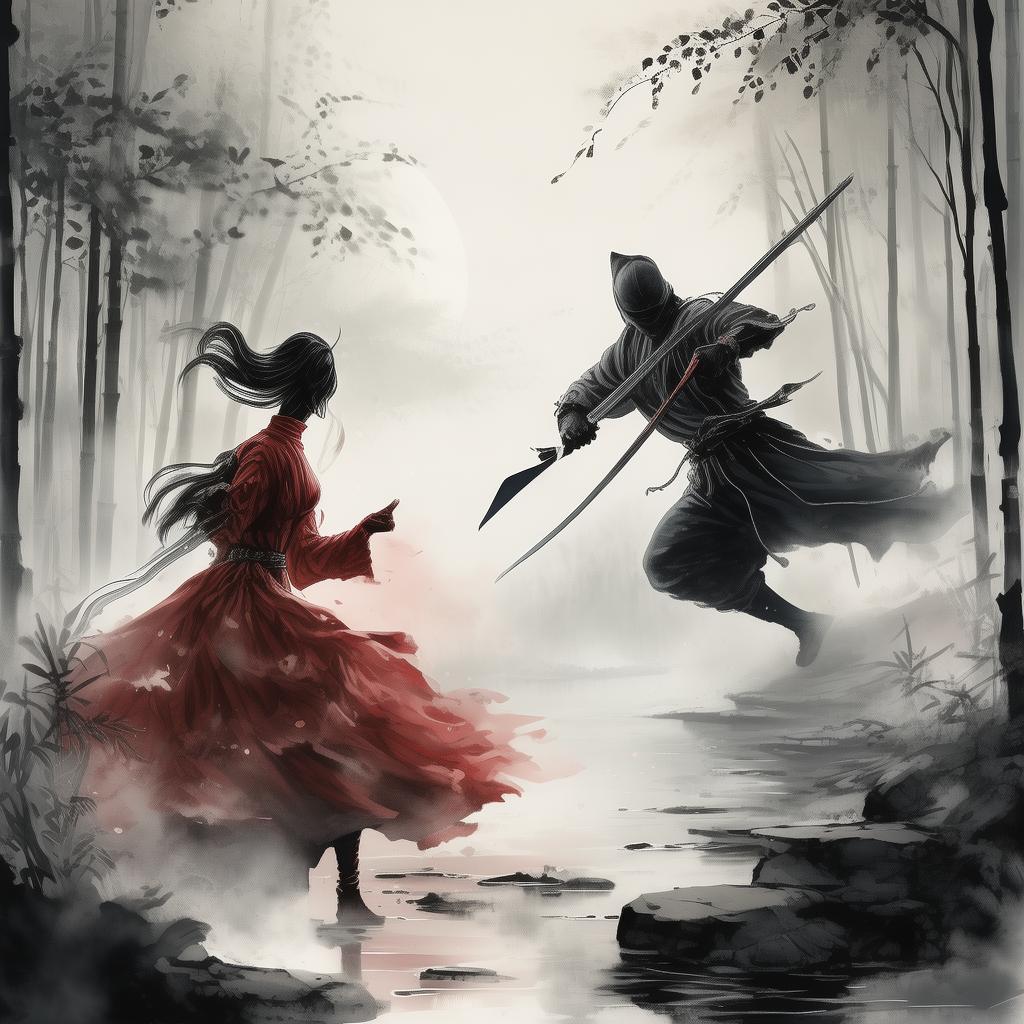The Zen of the Sword: A Martial Artist's Journey to Inner Peace
In the ancient realm of Tianxia, where the wind howled through the towering mountains and the rivers roared with the fury of the gods, there lived a masterless swordsman named Qing. His name was whispered among the warriors, for he was known not for his skill with the blade, but for the tranquility that seemed to emanate from his presence. Qing was a philosopher in the flesh, a seeker of the profound truths hidden within the art of martial combat.
The land of Tianxia was a tapestry of constant conflict, where factions vied for power and honor, and the sword was the currency of the realm. Yet, Qing's heart was not set on the conquest of others, but on the conquest of his own inner turmoil. He sought the Zen of the Sword, a state of inner peace that would allow him to wield his weapon with the grace of a flowing river and the strength of the mountains.
The story begins with Qing in the heart of a battle, surrounded by a sea of enemies. His opponent, a fearsome warrior named Feng, was a master of the Five Elements style, whose attacks were as unpredictable as the elements themselves. Qing stood his ground, his eyes closed, his breath synchronized with the rhythm of the fight. He was not fighting for victory, but for a moment of clarity, a glimpse into the essence of combat.
As the battle raged on, Qing's movements became less about offense and more about defense, a dance with the wind and the earth. He realized that the true enemy was not the man in front of him, but the chaos within his own mind. With each parry and thrust, he chipped away at the layers of his own ego, his thoughts becoming as still as the ancient mountains.
One fateful moment, Feng's blade came down with the force of a thousand thunderbolts. Qing did not block, did not dodge. Instead, he allowed the force of the strike to pass through him, feeling the impact resonate within his very soul. In that instant, he felt a profound connection to the sword, to the very essence of his being.
After the battle, Qing wandered the desolate lands, his mind a tranquil lake. He encountered a wise old monk who lived in a cave high in the mountains. The monk, recognizing Qing's quest for inner peace, offered him a challenge: to meditate for a thousand days, without interruption, without distraction.
Qing accepted the challenge, and for the next thousand days, he meditated in the cave, his mind ever more focused, his spirit ever more pure. He began to understand the true nature of the sword, not as a weapon of destruction, but as a tool for self-discovery. He realized that the sword was a reflection of the martial artist's inner world, a mirror that showed the true strength and weakness of the wielder.
As the days turned into months, Qing's body grew weak, but his mind remained strong. He began to see the interconnectedness of all things, the way the flow of energy, or Qi, connected every living being. He understood that the martial artist's journey was not just a physical one, but a spiritual one as well.
One day, as Qing meditated, he felt a shift in his consciousness. He saw visions of the past, the present, and the future, all merging into a single, seamless tapestry. He understood that the sword was not just a weapon, but a symbol of the warrior's path, a path that led to enlightenment.

When the thousand days were complete, Qing emerged from the cave a changed man. His body was lean and his eyes were sharp, but his spirit was at peace. He had found the Zen of the Sword, the harmony between mind, body, and weapon.
Qing returned to the world of battle, but now with a new purpose. He fought not for glory or power, but for the balance of the land. His sword became a symbol of peace, a reminder that the true strength of a warrior lay not in the blade, but in the heart.
The Zen of the Sword became a legend, a tale of a man who had found inner peace amidst the chaos. And so, Qing walked the land, a beacon of tranquility, a reminder that the true warrior was one who had mastered not just the art of combat, but the art of living.
In the end, Qing's journey was not just his own, but a journey for all who sought to find peace within themselves. For in the heart of every warrior, there lay the potential for inner peace, the potential for the Zen of the Sword.
✨ Original Statement ✨
All articles published on this website (including but not limited to text, images, videos, and other content) are original or authorized for reposting and are protected by relevant laws. Without the explicit written permission of this website, no individual or organization may copy, modify, repost, or use the content for commercial purposes.
If you need to quote or cooperate, please contact this site for authorization. We reserve the right to pursue legal responsibility for any unauthorized use.
Hereby declared.









